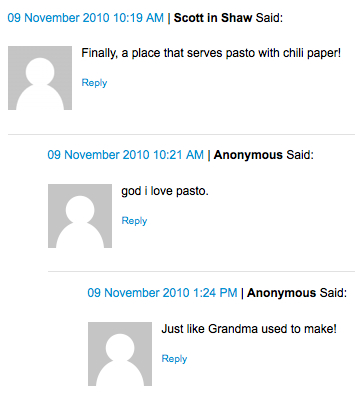It’s easy to be a critic, when English is your first language.

Santa Fe Nachos, Dos Coyotes, Davis, California
One of the things I miss most about Northern California is the Southwestern restaurant, Dos Coyotes. Please note: I did not say “Mexican” food. I fully admit I want some sort of “inauthentic” dish which contains spicy salsa, black beans and an obscene amount of cheese. That’s a pretty basic want, but it’s difficult to fulfill here in D.C. When I worked near K Street, I’d go to Pedro and Vinnie’s burrito cart and 80% of the time, I’d be satisfied; unfortunately, it’s not open for dinner or on the weekends. So I often end up at…Chipotle. I know. It’s not real, ethnic food. I know.
But it’s spicy and across from my house, so I go. When I do, the staff switches to Spanish while asking for my order. Years ago, I was fluent in it, so my accent is decent and I can bust out these impressive sentences every so often…but I’m much more likely to be left staring at the ceiling, agonizing over a verb I can’t remember. The 14th Street crew doesn’t mind this, in fact they exhort me to keep practicing. I do, because it’s kind of them to help me, but also because it is a potent reminder of how privileged I am.
I speak English.
It’s not my first language, but I speak it as if it were and I don’t take that for granted. When some dolt on the street compliments me by telling me something like, “You’re Indian? You speak good English for an immigrant!”, I smile a wan smile and reply that I was born to immigrant parents in California, where English is often spoken.
It’s easy to forget how difficult English is to learn, because we all take it for granted. We’re here. But for people in other nations, English is a puzzle. The pronunciation of the word “cough” makes no sense. As a teen, I used to preen and smirk at my ability to pick up French and Spanish rapidly– until my Father gruffly pointed out that they’re both romance languages and much easier to learn than English, something he studied for his entire childhood, in India.
My parents both studied at English-medium schools in India, so when they came to this country forty years ago, they were each fluent in the language and better prepared to communicate in it than other immigrants were. Recently though, and I’ve noticed this increasing as she ages, my Mother will enclose notes with packages from home that make my heart stop, because of how sweet they are– and because of how protective I feel of her, upon reading them: “Saw this when I was wondering thru the Mall and knew you’d like it, love you Mommy.”
Seven years ago, when I kept a visual diary via my photo blog, I would’ve taken a picture of the open package and all of the goodies it contained– but I would have hesitated to include the note. I wouldn’t want someone to make fun of my Mother and it’s not like she meant for the words she wrote in her beautiful, looping handwriting to be put on blast. But I’d always feel a twinge of worry– was I ashamed of who my Mother was? What was more appropriate and less self-serving? To be proud of all she had accomplished in this strange land, where she lacked family, friends and even a proper winter coat for a brutal Oklahoma winter in 1973, typos be damned? Or to privately feel my heart swell at her kindness while protecting her from scrutiny?
I thought of all of these things a few minutes ago, while reading this post at Prince of Petworth. PoP regularly investigates new restaurant openings, taking pictures and offering details about what to expect on the menu. This time, he was exploring what had happened to the space which once housed the popular Vegetate, in Shaw. It is now Cafe Eagle, and its menu is almost entirely Italian, with one Eritrean dish, too.
The menu is simple, probably printed late-night at Kinko’s, on blue paper. It is notable not for its offerings, but the misspellings which PoP’s commenters immediately noticed:
My initial reaction was to feel a surge of sadness and defensiveness on behalf of the hopeful proprietors of this space, whom PoP had called “super kind and quite enthusiastic”; I could picture them reading the post, their faces falling as they scrolled down. Then I remembered the irritation I feel when I go to an Indian restaurant and see typos, and how I’m always tempted to offer free proofreading services, but end up smiling and saying nothing. “Why can’t they proof these things?”, I mutter to myself, as I concomitantly feel concerned that others will hold mistaken letters or poor punctuation against them. Just like those commenters did. Pasto with paper sauce. Obviously, they meant “pasta with pepper sauce”.
I know, it’s a tiny thing to think about, and these anonymous commenters on another blog are irrelevant and just killing time at their desks, not conspiring to harm others. But I can’t help but think about it. I know something about people with brown skin, who sacrifice everything to come to a city like this, and work so hard to offer something of value to those who would snicker and point out their flaws, all the while ignoring their gifts.
-
Liz
-
fred
-
Anonymous
-
Anonymous
-
http://twitter.com/SaheliDatta Saheli Datta
-
Alien
-
Golden Silence








